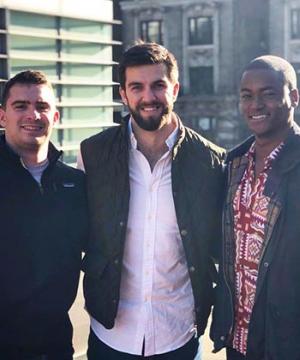Columbia Law School Students Big Winners in Investment Challenge
A 150 percent return, over four weeks, just might do it.
That was the conclusion of Arthur Holland ’18 when he started looking at past winners of the TD Ameritrade U “thinkorswim Challenge” in September of 2017. The nationwide stock trading contest gives teams $500,000 in paper money and four weeks to invest in the market. The first-place winner gets $30,000 donated to their school.
Holland and his Columbia Law classmates, Brandon Nesfield ’18 and Luke Martin ’20, were a little stunned though, when they actually landed in second place in the fourth annual competition with a 289.88 percent return. “We were ecstatic,” says Nesfield. “We’d all been huddled around a laptop on Arthur and my couch, watching the leaderboard, frantically refreshing the page.” Each of the three students will get $2,000 to deposit into an Ameritrade account, as well as an iPad.
In 2016, says Holland, the winning team had a return of about 120 percent. But in that year, Martin says, there had been a lot of uncertainty surrounding the election, and the chip sector had yet to emerge as a Wall Street darling. This year, the markets were generally quite strong, with technology companies in particular doing well. A return that was good enough for a win in 2016 might not cut it in 2017. His team would be competing against 932 others, 206 more than last year. "If you placed anywhere outside of the top three, you might as well run out of money," says Holland, whose team was called, Alpha Seeking Machine. "We knew this wasn’t the competition to play it safe."
Although none of the three friends were active traders, each had an interest in finance. Holland and Nesfield had both worked as summer interns in the corporate practice group at Kirkland & Ellis, and have accepted offers to return as associates after graduation. Before coming to law school, Martin had worked for two years as a senior analyst in Accenture's financial services practice. He also plans to go into corporate law after graduation.
The team was bullish and looked for a strategy to leverage that as best they could. They researched technology companies because Martin had some familiarity with the tech industry through his work at Accenture. They studied financial institutions, believing that financial services, as an industry, is generally growing. And they relied on out-of-the-money options—the option to buy a stock at a future date at a price above its current level. They tried to time those options to pay off around big events, such as earnings reports. "Traditionally, out-of-the money options are the most volatile," says Nesfield. Overall, they made 193 trades. All but three of them were options trades.
Their Intel options paid off the best. They traded them twice during the competition, investing a total of $70,710 and closed them out at $1,120,560, yielding a return of 1,585 percent, says Martin. The Facebook options did the worst, losing $262,020. "We mis-timed it," says Martin. "We were betting for it to go up a lot and it went up a little, so we lost the entire investment."
In general, the team placed relatively large, long-term bets.
Toward the end of the four weeks, the team could see on the online leaderboard that they had a chance to place in the top three. “By the end of the last week, when you see you’re about to place, you can’t help but constantly refresh the screen,” says Nesfield.
On Wednesday, with three days to go until the end of the contest, they were in the top five. By Thursday, Martin recalls, they were in third place. Early on Friday they were in second place, and closed out the majority of their positions. When the team was briefly in first place, they closed out everything and stayed glued to their screens.
By the time the market closed on Friday, November 4, the team had come in second, with a four-week return of 289.88 percent. The first-place winners were from CUNY Queens College, with a return of 427.24 percent.
Columbia Law will get $20,000 for the support of the school. "We're pretty excited about the iPad and the cash," says Nesfield. "But the honor and glory are paramount.”
###
Posted on November 30, 2017
